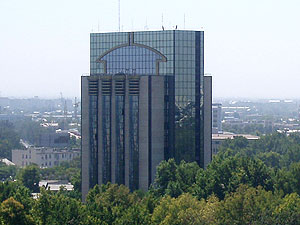The Central Bank of Uzbekistan explained the cause behind the raising of the interest rate, the Bank said in a statement.
“Against the backdrop of high uncertainty and tension in the external economic environment, the Central Bank raised the interest rate to 17% per annum in order to ensure macroeconomic and financial stability in the country by preventing the growth of devaluation and inflationary expectations, to maintain savings activity in the national currency and to mitigate the impact of external risks on the economy” , the statement says.
“In the current situation, the Central Bank will take all necessary measures to prevent a sharp increase in domestic prices, ensure the smooth operation of the payment system and financial stability,” the regulator assured.
External economic conditions
The economic situation in the main trading partner of Uzbekistan, sharp fluctuations in their exchange rates, rising prices in the world commodity and energy markets, spike in macroeconomic uncertainty and risks, the Central Bank noted.
Surveys conducted among the population and businesses show that there is a significant increase in their devaluation expectations.
These factors, through various channels, have a negative impact on domestic macroeconomic stability in the short to medium term, the statement said.
“A decrease in earnings from exports and remittances to the country may be reflected in a reduction in supply in the domestic foreign exchange market, an increase in the cost of imports of consumer goods due to an increase in domestic prices, medium-term effects are manifested in a reduction in external and domestic demand, which puts corresponding pressure on economic growth indicators,” emphasized in the Central Bank.
The implementation of macroeconomic and structural reform measures planned for 2022-2023 will create opportunities to mitigate these negative consequences, the regulator believes.
In the trend of the exchange rate of the national currency, there was an adjustment in response to external risks and devaluation pressure, and since the beginning of the year, the sum has depreciated by 6.8% against the dollar.
“Given the current situation, the Central Bank increased the volume of interventions in the domestic foreign exchange market in the first half of March this year in accordance with the “principle of neutrality” in order to prevent sharp fluctuations in the exchange rate and ensure the stable functioning of the market,” the statement said.
These interventions are carried out at the expense of additional reserves accumulated last year as a result of favorable conditions in the foreign exchange market.
In order to ensure stability in the market, appropriate interventions will be carried out in the future and measures will be taken to prevent sharp fluctuations in the exchange rate of the national currency, the Central Bank said. “Today’s increase in the main rate is also aimed at mitigating emerging short-term adverse effects (shocks),” the Central Bank explained.
Additional measures taken to minimize external risks
In order to provide the banking system with the necessary liquidity, the Central Bank will provide short-term liquidity to commercial banks without restrictions (through REPO and SWAP transactions).
The limits of the average monthly balance of short-term bonds issued by the Central Bank have been increased to 20 trillion soums.
Commercial banks until July 1 of this year:
- are given the opportunity to use the exchange rate formed as a result of a call auction on the currency exchange to establish exchange rates for retail transactions;
- interest rates at auctions on bonds of the Central Bank purchased by commercial banks have been raised to the upper limit of the interest rate corridor;
- limits on two-week deposit auctions were cancelled.
Meanwhile, the Central Bank is revising the forecast of macroeconomic development, taking into account external economic factors. At the same time, as inflation and devaluation expectations decrease, external pressure on domestic macroeconomic conditions decreases, the main rate will be gradually reduced.
The next meeting of the Board of the Central Bank to consider the main rate is scheduled for April 21.












